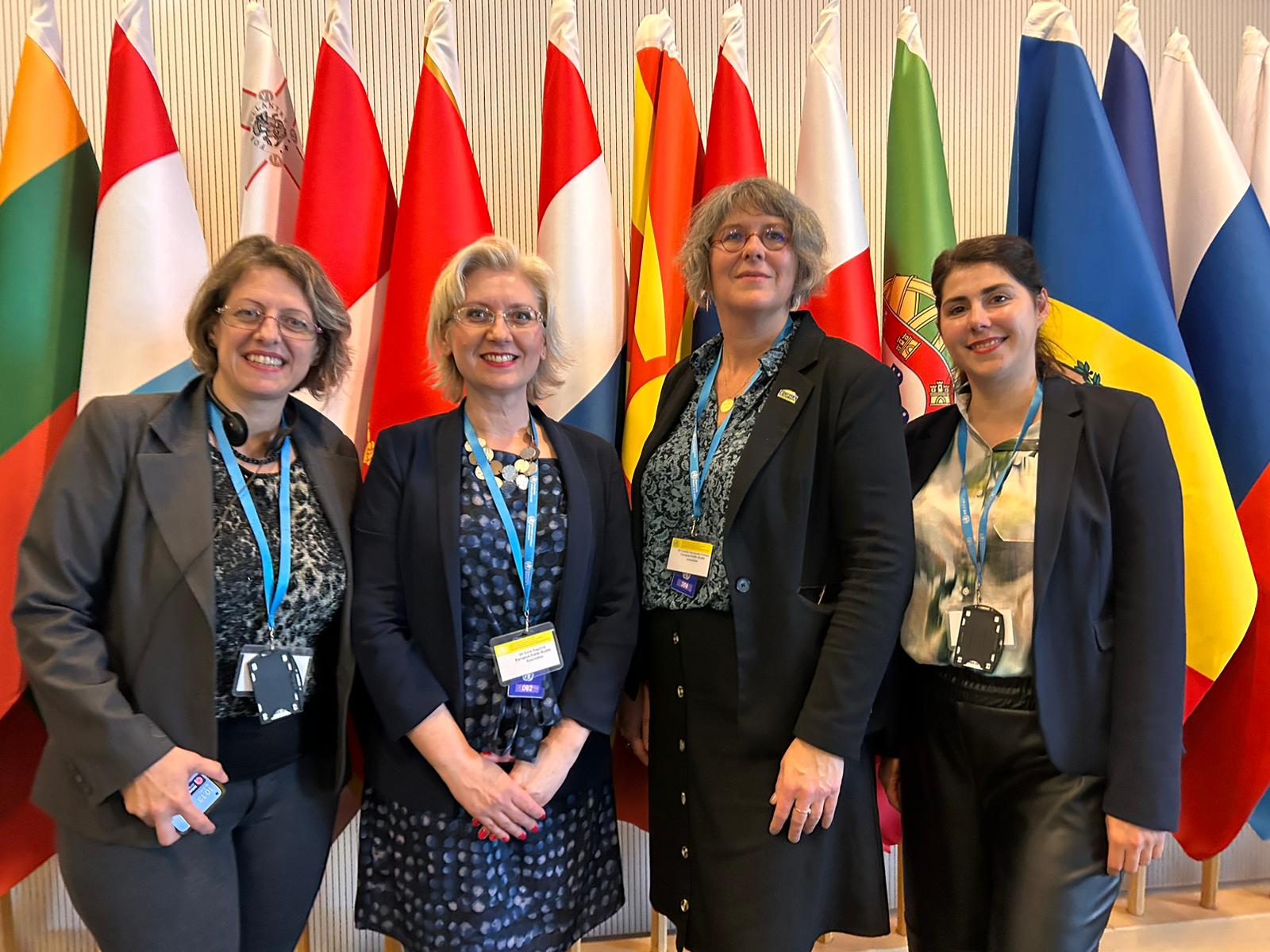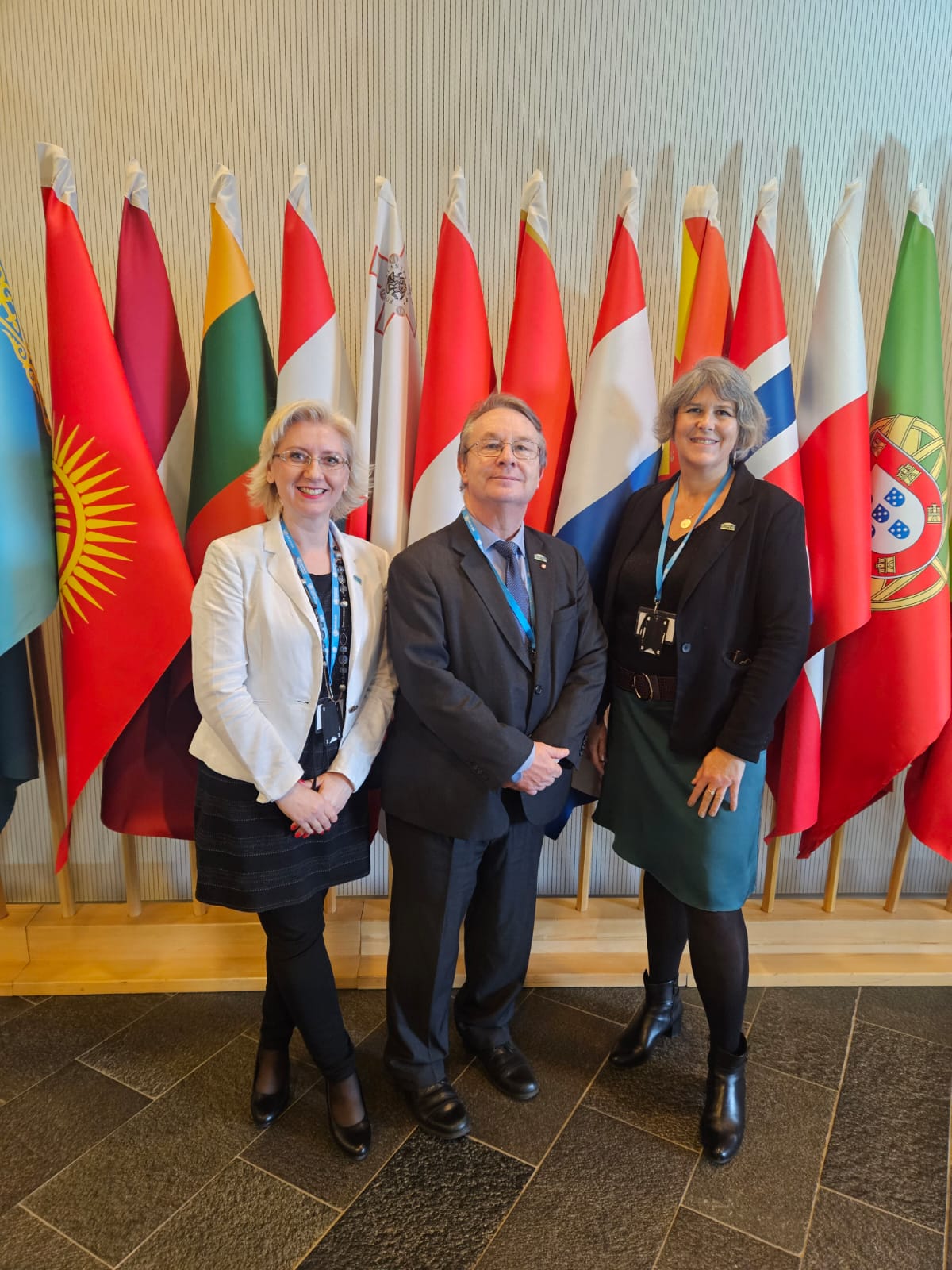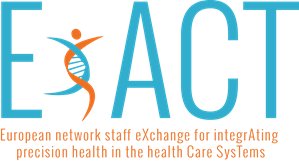 |
The European Public Health Association Newsletter - October 2024 |
|
Newsletter - October 2024 |
1. EditorialWe approach the much-anticipated EPH Conference in Lisbon, and for the first time in EPH’s history, we reached full capacity and had to close registration early. This milestone reflects not only the growing interest in public health across Europe and beyond but also the dedication and passion of all those committed to advancing health and well-being for all. This momentum speaks to a collective recognition that health challenges—whether from digital stakes, climate change, pandemics, or social inequalities—demand collaboration, innovation, and resilience. Thank you for being part of this journey with us. We look forward to seeing those of you joining us in Lisbon and continuing to drive meaningful change for public health together. Wishing you a pleasant read. Dr Iveta Nagyova, EUPHA President, and Charlotte Marchandise, Executive Director |
2. EUPHA updateEPH Conference Lisbon 2024 StatementNext month we will meet at the 17th European Public Health Conference in Lisbon, Portugal, to exchange views on the theme ‘Sailing the waves of European public health: exploring a sea of innovation’. We are committed to advancing public health across Europe. Guided by the theme of innovation, we strive to foster responsible, affordable, and equitable innovations that address the evolving public health challenges. Our focus on sustainability, collaboration, and citizen empowerment ensures that public health actions are inclusive and impactful, bridging science, policy, and communities for a healthier Europe.
Click here for the statement webpage and the link to the pdf version with supporters. Joint Written Statement 74th Session of the WHO Regional Committee for Europe by EUPHA and other Non‐State Actors on Harnessing innovation for public health in the WHO European Region 2025–2030: Preparing for a new strategyThe European Public Health Association (EUPHA) and our co‐signatories commend the WHO’s prioritization of innovation as a core enabler of public health advancement in our region. Today’s health challenges - ranging from a surge in chronic non‐communicable diseases, including mental health problems and rare diseases, antimicrobial resistance, the health needs of children and ageing populations, to urbanization, resurgent vaccine‐preventable diseases, and widening inequalities in health—are complex and demand new transformative strategies. Traditional methods alone are insufficient; we need innovative solutions and a reimagined approach to health that integrates policy, science, and societal engagement.
Photo left: Left to right: Maria Papadakaki, Section president Injury prevention and safety promotion, Iveta Nagyova, EUPHA President, Charlotte Marchandise, EUPHA Executive Director, Sarah Abitbol, EUPHA Senior policy officer EUPHA welcomes and supports the Economist Group's decision to cease its engagement with the tobacco industryEUPHA will be happy to re-connect with the Economist Group and work jointly on their health initiatives, which have previously had an important and engaging policy impact. This statement follows the Economist Group’s decision to terminate their relationship with the tobacco industry, which confirms and supports their commitment to public health and public health policies. Read the full statement here. Ethics and law for good public health praxis and policyThere are plans for a conference / roundtable on Ethics and law for good public health practice and policy, as well as a special supplement of Journal of public health on the issue. This is part of the initiative by EUPHA, ASPHER, Global Network for Academic Public Health, Faculty of Public Health and other partners through the Public health ethics and law network to further advance the scholarship, the discourse and practice, as part of efforts to build ethicolegal competence and capacity of public health workforce and institutions. Issues to be covered will include: code of ethics and professional conduct for public health professionals and institutions; education and training; moral distress and injury; law, governance for climate action; and other areas. ExACT has come to an end
Research results were published: Pezzullo AM, Sassano M, Hoxhaj I, PastorinoR, Boccia S. "Citizen Engagement Initiatives in Precision Health in the European Union MemberStates: A Scoping Review." BMJ Open. 2021 Jul 9;11(7) doi: 10.1136/bmjopen-2020-045846. More results will soon be submitted to a scientific journal for peer review and publication. |
3. European Public Health Conference17th EPH CONFERENCE, LISBON, PORTUGAL SAILING THE WAVES OF EUROPEAN PUBLIC HEALTH: EXPLORING A SEA OF INNOVATION NOTICE: Main conference fully boookedWe have closed registration for the main EPH Conference since we have reached the maximum number of people allowed in the CCL with 3,000 delegates. Registration for the full main conference is no longer possible. Also not onsite in Lisbon. THERE IS NO WAITING LIST. Please do not contact registration about this. Registration for pre-conferences and for the Lusofonia Conferencia is still open. Onsite registration for these activities is possible. Plenary programmeThe plenary programme is a true journey of discovery of our theme for this year: Sailing the waves of European public health: exploring a sea of innovation. The journey takes us to the following thematic areas of public health: Opening Ceremony. Wed 13 Nov. 11:45-12:45 Lisbon time. With Sara Cerdas, Former Member of the European Parliament 2019-2024, Portugal. Plenary 1 Navigating the AI wave: overcoming barriers and unleashing the potential of AI in transforming European public health. Wed 13 Nov, 14:00–15:00, organised by WHO Regional Office for Europe, European Observatory on Health Systems and Policies, exploring how AI is transforming disease surveillance, healthcare delivery, and decision-making. With Natasha Azzopardi-Muscat, WHO Euro; Martin McKee, LSHTM; Lorena Boix, Deputy Director-General, DG SANTE; Katharina Ladewig, Robert Koch Institute; Dimitra Panteli, Observatory; Keyrellous Adib, WHO Euro; and Stefan Buttigieg, EUPHA Digital health section Plenary 2 Global Health: how can European public health efforts contribute to global health solutions? Wed 13 Nov, 18:00–19:00. Organised by EUPHA and ASPHER. With: Iveta Nagyova, President EUPHA; Henrique Barros, President ASPHER; Agnes Buzyn, former Minister of Health, France; Emma Rawson-Te Patu, President WFPHA; Charles Agyemang, University of Amsterdam, Netherlands; Moredreck Chibi, Innovation Lead WHO Euro. Plenary 3 Tackling health inequalities in times of crisis. Thu 14 Nov, 10:30–11:30, organised by EuroHealthNet. With: Fran Baum, The Stretton Institute, The University of Adelaide, Australia (by video message); Katarina Ivanković Knežević, Director for Social Rights and Inclusion, DG EMPL; Didier Jourdan, UNESCO Chair, University of Clermont-Auvergne, France; Jill Litt, University of Colorado, USA and Barcelona Institute of Global Health (ISGlobal), Spain; Caroline Costongs, Director EuroHealthNet. Plenary 4 Harnessing social marketing for interdisciplinary health management: enhancing public health outcomes. Thu 14 Nov, 14:00–15:00, organised by European Health Management Association (EHMA). With: Tiago Correia, Universidade NOVA de Lisboa and EHMA; Marina Macchiaiolo, Bambino Gesù Children's Hospital, Italy; Stefano Capolongo, DABC Design & Health Lab, Italy; George Valiotis, Executive Director of Health Technology Assessment International (HTAi); Stanislava Boskovic, Department of Civil and Environmental Engineering, Imperial College London. Plenary 5 One Health in Europe: from concept to practice. Fri 15 Nov, 10:30–11:30, organised by European Commission. Keynote speaker Roser Domenech Amado, Director for One Health, DG SANTE. Panellists: Stef Bronzwaer, European Food Safety Authority (EFSA); Barbara Häsler, Royal Veterinary College, UK; Susana Guedes Pombo, Chief Veterinary Officer, Portugal, President World Organization for Animal Health (WOAH); Eva Zažímalová, Co-lead One Health Scientific Opinion. Closing Ceremony. Friday 15 November, 15:15-16:00. With Ricardo Baptista Leite, President and Founder UNITE, Parliamentarians Network for Global Health. Pre-conference programmeThere are still plenty of places available in the pre-conference programme. The following sessions are the latest additions to the programme: From insight to impact: advancing equitable vaccination across Europe (VACC), organised by RiseVac, RiverEU and AcToVax4NAM projects. This workshop will present the experience and knowledge from three EU co-funded projects which work with marginalized populations to increase vaccination uptake. Best practices in EU-wide projects contributing to achieving the objectives of EU Health policies (NFP4) The European Health and Digital Executive Agency (HaDEA) and Joint Action on increasing the capacity of National Focal Points (NFPs) bring together different actions funded under the EU4Health and Horizon programmes. The focus is on prevention of non-communicable diseases, including cancer, and on vaccination. Exploring the European Health Data Space: a journey guided by the HealthData@EU pilot project (EHDS) This session will showcase how this innovative initiative contributes to unlocking EHDS's potential for secondary health data use. Young Researchers’ Forum (YRF), organised by ASPHER and EUPHA. You can add a pre-conference to your existing registration by sending an email with your preferred pre-conference to registration@ephconference.eu. Other pre-conferences deal with thematic fields as cancer prevention; health literacy; Artificial Intelligence; social security, work and health; digital health; strategic foresight methodology; behavioural and cultural insights; prevention and preparedness; syndromic surveillance systems; enhancing your writing skills; and future health scenarios. Detailed information here. Lunch symposium programmeWe are pleased to announce an exciting lunch symposiums programme. Lunch symposiums are held during the extended lunch hours of the conference. Registration not required. Get your lunch in the Exhibition / Catering Area, walk in and join the session. Wed 13 Nov, 12:55–13:55 (Lisbon time) Focus on respiratory syncytial virus (RSV) in older adults: Disease burden and the potential impact on public health of prevention, organised by GSK Commercial determinants of NCDs in the WHO European Region: A call to action, organised by WHO Regional Office for Europe Everything you want to know about EUPHA, organised by EUPHA Thu 14 Nov, 12:55–13:55 (Lisbon time) Late breaker Reimagining public health services in Ukraine: leadership and action for change amid the war, organised by USAID, Pact, Swiss TPH, European Institute of Public Health Policy (EIPHP) Avoiding future Respiratory Tripledemics: what do we need to do collectively in Europe?, organised by Sanofi Crawl, Walk, Run: a commonsense approach to data and system modernization for public health and disease surveillance programmes, organised by Conduent, Healthcare solutions Fri 15 Nov, 12:55 – 13:55 (Lisbon time) Data-driven health policies: Informed decision-making for Cervical Cancer elimination in Europe, organised by MSD Mapping and changing the food environment in Europe: from theory to practice, organised by the European Public Health Nutrition Alliance (EPHNA) The making of a Public Health Leader: unveiling leadership journeys, organised by EUPHAnxt, WHO Regional Office for Europe Conferência de Saúde Pública da Lusofonia
Registration is through the EPH Conference registration panel. The Lusophone Conference is organized by EPH Conference, the Portuguese Association for Public Health (APPSP) and the National Association of Public Health Doctors (ANMSP). Read more here. Conference venueThe 17th EPH Conference will be held in Lisbon, Portugal, from 12 – 15 November 2024. Theme of the EPH conference 2024 is: Sailing the waves of European public health: exploring a sea of innovation. The main conference is from 13 – 15 November. Pre-conferences will be held on 11 and 12 November. The 17th EPH Conference will be held at the Lisbon Congress Center (CCL). Click here for a virtual tour.
|
5. Call for proposals, job opportunitiesCall for Editors' for the Journal of Health Services Research & PolicyThe Journal of Health Services Research & Policy aims to bring together health services research and rigorous policy analysis, and to engage in, and respond to, current policy and scientific debates. JHSRP is a small, niche, non-for-profit journal published by SAGE Publications Ltd. Deadline for initial expressions of interest: 8th November 2024 (early applications may be prioritised). Click here to learn more. Job vacancies at the European Centre for Disease Prevention and Control (ECDC)
For more information, please visit the ECDC website here. |
6. Interesting newsPersonalised Prevention: the PROPHET project elaborates a Strategic Agenda and nine concrete challenges for the future of public healthOn October 1, 2024, the first draft of the Strategic Research and Innovation Agenda (SRIA) for the EU-funded PROPHET (“a PeRsOnalized Prevention roadmap for the future HEalThcare”) project was unveiled in Stockholm at a dedicated event. The agenda identifies nine major challenges in advancing personalised prevention in healthcare. These include creating a continuous evidence synthesis system, improving data collection and integration, developing suitable infrastructures, and fostering community engagement to build trust. The SRIA also addresses regulatory frameworks, collaboration with the private sector, ensuring equity and access, and tackling ethical, legal, and social issues. Each challenge is followed by specific objectives, concrete actions to overcome them, timelines, assigned responsibilities, clear output indicators and necessary financial resources. |
7. Upcoming courses and conferences
|
8. Interesting publicationsTurning the global health and care workforce crisis into action: the pathway to effective evidence-based policy and implementationAuthors:Tiago Correia, Ellen Kuhlmann, Gabriela Lotta, André Beja, Rita Morais, Tomas Zapata, James Campbell |
9. European Institutions’ newsA New CommissionAs a reminder:
Every five years, the EU goes through a legislative renewal. In June 2024, the European Parliament (EP) elections resulted in a significant shift towards the right. Following the elections, each Member State proposed two candidates (a man and a woman), and Ursula von der Leyen, re-elected as President of the European Commission in July, selected her preferred Commissioners. These candidates then undergo hearings before the EP, which must approve their appointments. Once confirmed, the new Commission will set its agenda for the next five years. While the full agenda has yet to be finalized, several indicators suggest a shift in priorities:
These signals point to a shift away from the previous Commission's focus on the European Green Deal, which aimed for climate neutrality by 2050, toward an emphasis on competitiveness. This change places public health lower on the EU policy agenda. It's also worth noting that Várhelyi's confirmation is not guaranteed, as he faces skepticism and opposition within the Parliament. European Parliaments' ongoing debatesThe SANT and EMPL committees are expected to release a joint report on the healthcare workforce soon, with discussions ongoing about which committee will take the lead on this critical issue. Climate and Environmental HealthLaunch of COP16 on Biodiversity. COP29 Climate Summit Final Declarations PublishedThe COP29 Presidency has released the final texts of declarations and pledges for the upcoming UN Climate Summit, setting the groundwork for enhanced global climate commitments. These declarations focus on accelerating climate action and achieving the goals of the Paris Agreement. Digital Health and InnovationThe European Medicines Agency (EMA) and Heads of Medicines Agencies (HMA) have released a draft strategy and are seeking public input on how to adapt to innovations like personalized medicine and digital health tools, with the goal of improving access and safety of medicines across Europe. Mental Health and Well-beingTo mark World Mental Health Day, the European Commission is launching an EU Support Package on Stigma and the “In This Together” campaign, backed by €18 million in funding, to break down barriers to mental health care across Europe. Click here to read more. Resilience and PreparednessEU Health Emergency Preparedness and Response Authority (HERA) Past events & recordings from the European Observatory on Health Systems and PoliciesHealth for All Policies spotlight series: How health and health systems contribute to the SDGs
WHO and European Observatory join efforts to strengthen financing of rehabilitation services in UkraineNew research launched by WHO Ukraine, in collaboration with the European Observatory on Health Systems and Policies and the WHO Barcelona Office for Health Systems Financing, will map the current landscape of rehabilitation services in a sample of European countries, with the goal of outlining policy decisions that can strengthen rehabilitation care in Ukraine through its health system’s financing. The study will seek to assess how countries across Europe finance rehabilitation services in health systems and leverage these experiences to inform and shape Ukraine’s own financing of rehabilitation care. Read more here. |
10. European Centre for Disease Prevention and Control newsEurosurveillance - Volume 29, Issue 40, 03 October 2024Rapid communication Research Miscellaneous Eurosurveillance - Volume 29, Issue 41, 10 October 2024Rapid communication Systematic Review Surveillance Research Eurosurveillance - Volume 29, Issue 42, 17 October 2024Rapid communication Surveillance Perspective Letter Eurosurveillance - Volume 29, Issue 43, 24 October 2024Surveillance Research Perspective Author's correction |
11. WHO newsDr Hans Henri P. Kluge nominated by Member States to serve as WHO Regional Director for Europe for a second 5-year termThe Member States of the WHO European Region have nominated Dr Hans Henri P. Kluge to the office of WHO Regional Director for Europe for a second 5-year term, which will begin in February 2025 after his formal election by the WHO Executive Board. Advancing the implementation of the One Health approach in the WHO European RegionThe health of humans, animals and ecosystems is linked – this has long been noted. With this interconnectedness comes the risk of spreading many types of infectious diseases, as was highlighted by the COVID-19 pandemic. An integrated One Health approach addresses these linkages and vulnerabilities, aiming to sustainably balance and optimize the health of people, animals and ecosystems through multisectoral and disciplinary collaboration. Alarming decline in adolescent condom use, increased risk of sexually transmitted infections and unintended pregnancies, reveals new WHO reportNew report reveals high rates of unprotected sex among adolescents across Europe, with significant implications for health and safety Accelerating digital health transformation in Europe: a two-year progress reportDigital transformation of health care is picking up across the WHO European Region, according to WHO/Europe’s progress report on the Regional digital health action plan for the WHO European Region 2023–2030. The report is accompanied by a new set of illustrative actions which reflect evolving needs and latest advancements in digital health. It provides an overview of significant progress made to date across all 18 key focus areas outlined in the action plan, driving innovation, improving access to care, and strengthening health systems. WHO European Region Member States adopt new vision for resilient and sustainable health systemsThe 53 Member States of the WHO European Region have adopted a new framework on resilient and sustainable health systems, marking a significant shift in the vision for health delivery across the Region. Building on the Tallinn Charter: Health Systems for Health and Wealth, and on the 2023 Tallinn outcome statement, the new framework is a blueprint for countries to adopt and set out a transformational agenda for strengthening health systems, ensuring that they are resilient, sustainable, and responsive to the diverse needs of populations in a rapidly changing global landscape. WHO Director-General's remarks at the 74th session of the Regional Committee for Europe – 29 October 2024Listen to the opening remarks here. |
|
|
|
Unsubscribe If you would like unsubscribe from the EUPHA newsletter then please click here. |


 The ExACT project (European network staff eXchange for integrAting precision health in the health Care sysTems) has been completed. The project aimed at building a community of academic and non-academic institutions generating high quality, multidisciplinary collaboration by exchanging knowledge in research and training activities on precision health.
The ExACT project (European network staff eXchange for integrAting precision health in the health Care sysTems) has been completed. The project aimed at building a community of academic and non-academic institutions generating high quality, multidisciplinary collaboration by exchanging knowledge in research and training activities on precision health.


